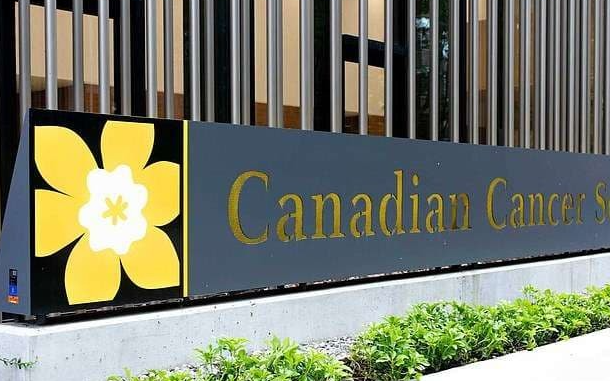
A top cancer charity has apologized for using the word ‘cervix’ instead of trans-friendly ‘front hole.’
The Canadian Cancer Society, which is run by philanthropist Andrea Seale, acknowledged the LGBTQ+ community on a webpage dedicated to cervical cancer, under the page’s ‘words matter’ section.
The non-profit said that ‘many’ non-binary people and transgender men have ‘mixed feelings’ or ‘feel distanced’ from the term cervix.
{snip}
‘You may prefer other words, such as “front hole.” We recognize the limitations of the words we’ve used while also acknowledging the need for simplicity. Another reason we use words like “cervix” is to normalize the reality that men can have these body parts too.’
Cervical cancer occurs when a growth of cells form inside the cervix, the lower part of the uterus that connects to the vagina.
Most of the time, it’s caused by the common sexually transmitted infection human papillomavirus (HPV).
The cancer can be treated with radiation, chemotherapy, medicine and surgery to remove the cells.
According to the Canadian Cancer Society, anyone with a cervix, ‘regardless of gender or sexual orientation,’ should get regular cervical cancer screenings or pap smears by the age of 25.
The non-profit added that people need to get screened every three years regardless if they are taking testosterone or not.
{snip}
The Canadian Cancer Society also noted that healthcare providers ‘should help you understand the benefits and limitations of cancer screening.’
‘They should affirm your gender and perform any tests in a way that reduces your discomfort and any feelings of gender dysphoria you may have as much as possible,’ the charity said.
The charity also highlighted ways that trans, non-binary and gender-diverse people face ‘significant barriers’ when accessing healthcare, including transphobia and discrimination, limited knowledge from healthcare providers, concerns about emotional and physical safety, and a ‘lack of trans-specific resources.’
Many commenters quickly flocked to social media to respond to the non-profit’s stance.
‘Cervix! I have a damn cervix. This is just gross. You will never receive another donation from me,’ one said.
Another wrote: ‘How uncaring are you to ignore the identity, biology amd [sic] feelings of people who actually have a cervix. You need to be ashamed.’
{snip}
‘It may be time to walk away from the Canadian Cancer Society. They have lost the plot,’ Quiggin said on Friday.
Another commenter said: ‘I guess the Canadian Cancer Society doesn’t want our donations. Why else would they insult women like that.’
The viral Twitter account Libs of TikTok also said that the charity’s statement was ‘beyond parody.’
‘UNREAL. In order to be “inclusive,” the Canadian Cancer Society will no longer use the term “cervix” and instead us the term “front hole”. Beyond parody,’ the account said.
Others purposely commented the word ‘CERVIX’ under an Instagram post that the charity made on Wednesday.
DailyMail.com contacted the Canadian Cancer Society for comment.
This is not the first time the charity has voiced its opinion on transgender women and cervical cancer.
{snip}
Canada’s largest cancer charity said there is a ‘very small risk’ that transgender women can ‘develop cancer in the tissue used to create your vagina and cervix.’
The recommendation only extends to those who have had bottom surgery – a vaginoplasty – as those with male genitalia do not have a cervix, and therefore don’t run the risk of cervical cancers.
A ‘neo-cervix,’ which can be made from penile skin, can contract human papillomavirus (HPV), which can lead to cervical cancer.
‘If you’re a trans woman and have not had bottom surgery, you aren’t at risk for cervical cancer,’ the Canadian Cancer Society wrote in an article.
‘If, however, you’re a trans woman who has had bottom surgery to create a vagina (vaginoplasty) and possibly a cervix, there’s a very small risk that you can develop cancer in the tissues of your neo-vagina or neo-cervix.’
The Canadian society says neo-cervixes are at risk of developing cancer as both penile skin and skin found in the female reproductive system can contract human papillomavirus (HPV), which can lead to cancer. HPV is a sexually transmitted disease that can be contracted through vaginal, anal, or oral sex.
The vaccine for HPV is more than 90 percent effective, experts have estimated.
{snip}
Both cisgender and transgender women can detect cervical cancer through pap smears.
An ovarian cancer charity in the UK recently sparked outrage after being accused of endangering women and insulting victims by claiming anyone can get the disease ‘regardless of gender’.
Ovarian Cancer Action sparked fury with its tweet, which featured the LGBT+ rainbow flag and said: ‘Let’s raise awareness by asking: Can men get ovarian cancer?’
It added: ‘Anyone with ovaries, regardless of gender identity, can be at risk of ovarian cancer.’
TV presenter Piers Morgan was among the X users to respond to the post, saying: ‘What the hell are you talking about?’
‘Only WOMEN have ovaries, and if you think men do too then you should be nowhere near public health.’
The Ovarian Cancer Action website describes ovaries as ‘part of the female reproductive system’ and its homepage says: ‘Women don’t just deserve better, they deserve the best.’
{snip}
The disease is often diagnosed late as the symptoms are common and often mistaken for irritable bowel syndrome.
They include bloating, stomach pain, difficulty eating and needing to wee more frequently.
* Original Article:
https://www.dailymail.co.uk/news/article-13510709/amp/cervical-canadian-cancer-society-cervix-hole.html?ito=smartnews